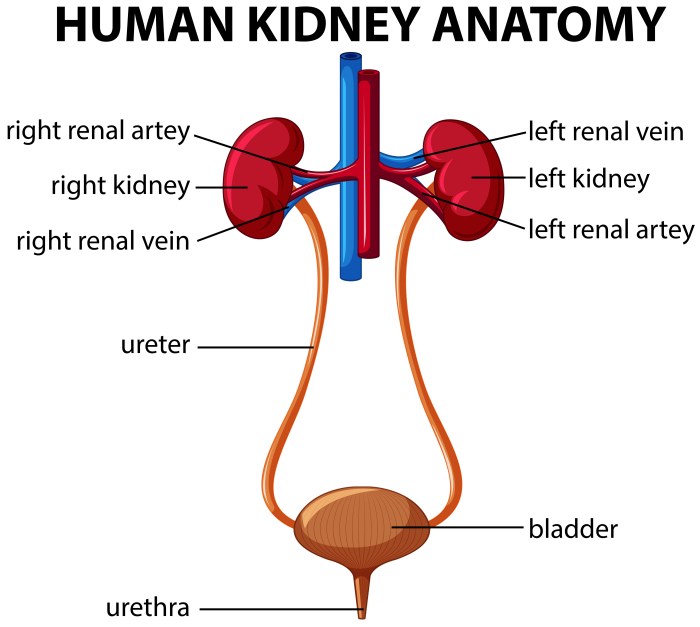Level up rn renal system – Level up your renal system and embark on a journey of understanding the vital role your kidneys play in maintaining your health. Dive into the fascinating world of urine formation, hormone regulation, and the intricate mechanisms behind renal function.
From acute kidney injury to chronic kidney disease, we’ll explore the causes, mechanisms, and implications of these conditions. Discover the principles of fluid and electrolyte management, the benefits of renal replacement therapy, and the power of lifestyle modifications in managing renal health.
Overview of the Renal System: Level Up Rn Renal System
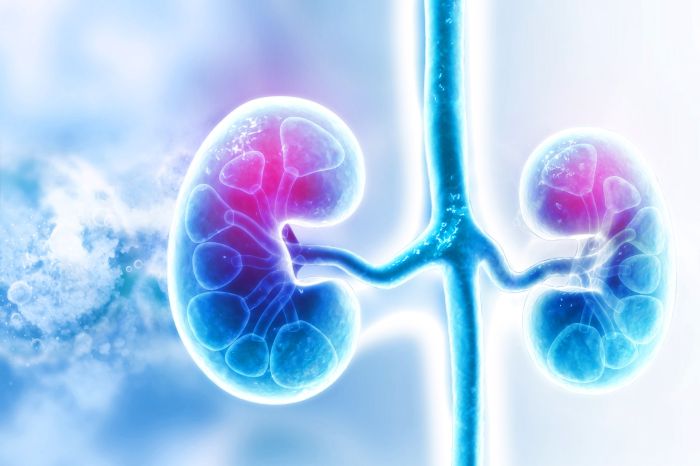
The renal system plays a vital role in maintaining the body’s internal environment and overall health. The kidneys, the primary organs of this system, are responsible for filtering waste products from the blood and regulating fluid and electrolyte balance.
Structure and Function of the Kidneys
Each kidney is a bean-shaped organ located on either side of the spine. Internally, they have a complex structure consisting of millions of tiny filtering units called nephrons. Each nephron comprises a glomerulus, a network of capillaries where blood is filtered, and a renal tubule, a long, coiled tube where reabsorption and secretion of substances occur.
Pathophysiology of Renal Disease
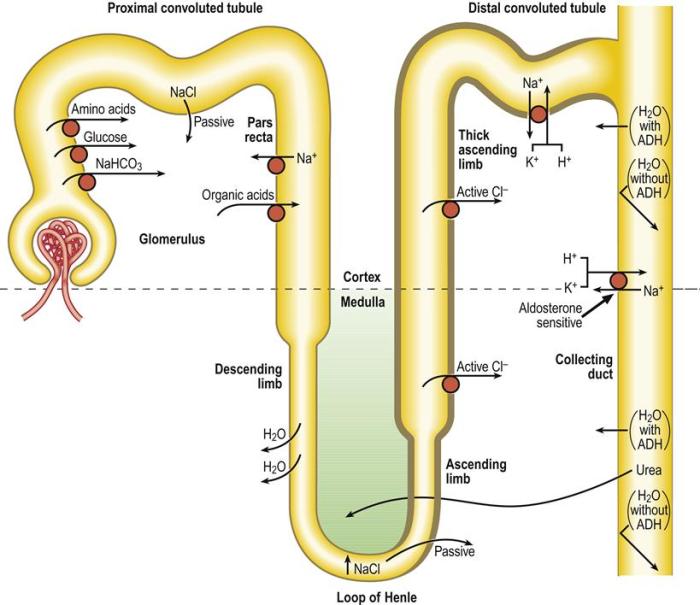
The renal system is responsible for maintaining the body’s fluid balance, electrolyte balance, and pH. When the renal system is damaged, it can lead to a variety of health problems, including acute kidney injury (AKI) and chronic kidney disease (CKD).
Acute Kidney Injury (AKI)
AKI is a sudden loss of kidney function that can occur over a few hours or days. It is often caused by a major illness or injury, such as a heart attack, stroke, or sepsis. AKI can also be caused by certain medications, such as nonsteroidal anti-inflammatory drugs (NSAIDs) and aminoglycoside antibiotics.
The symptoms of AKI can include decreased urine output, swelling in the hands and feet, and fatigue. If AKI is not treated, it can lead to kidney failure and death.
Chronic Kidney Disease (CKD)
CKD is a gradual loss of kidney function that occurs over months or years. It is often caused by diabetes, high blood pressure, and other chronic diseases. CKD can also be caused by certain medications, such as lithium and chemotherapy drugs.
The symptoms of CKD can include increased urine output, fatigue, and loss of appetite. If CKD is not treated, it can lead to kidney failure and death.
Stages of CKD
CKD is classified into five stages based on the severity of the kidney damage. The stages of CKD are:
- Stage 1: Mild kidney damage with normal kidney function
- Stage 2: Mild to moderate kidney damage with slightly decreased kidney function
- Stage 3: Moderate to severe kidney damage with significantly decreased kidney function
- Stage 4: Severe kidney damage with very low kidney function
- Stage 5: Kidney failure
The earlier CKD is diagnosed and treated, the better the chances of preventing kidney failure.
Management of Renal Disease
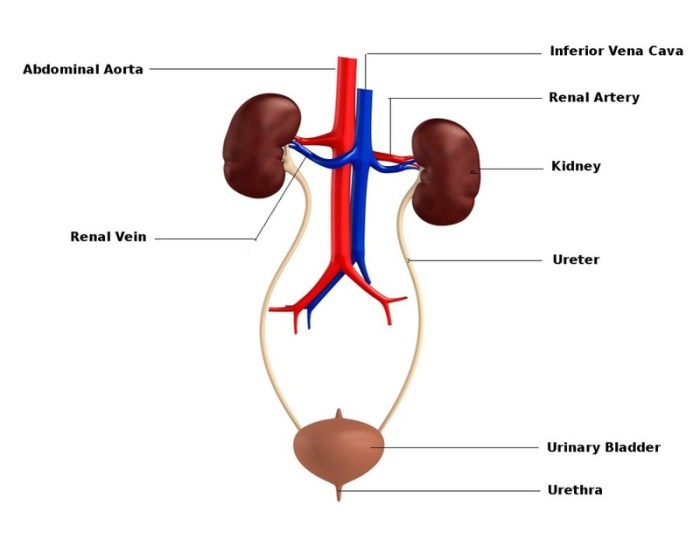
Effective management of renal disease involves a multifaceted approach that addresses fluid and electrolyte imbalances, the implementation of renal replacement therapy when necessary, and the adoption of appropriate dietary and lifestyle modifications.
Principles of Fluid and Electrolyte Management in AKI
Acute kidney injury (AKI) often requires meticulous fluid and electrolyte management to maintain homeostasis and prevent further complications. The primary goals include:
- Restoring and maintaining euvolemia (normal fluid balance)
- Correcting electrolyte imbalances
- Preventing fluid overload and pulmonary edema
Indications and Benefits of Renal Replacement Therapy
Renal replacement therapy (RRT) becomes necessary when the kidneys are unable to adequately perform their functions. Indications for RRT include:
- Severe AKI with oliguria or anuria
- Electrolyte imbalances that cannot be corrected with conservative measures
- Metabolic acidosis or alkalosis
RRT modalities include hemodialysis, peritoneal dialysis, and continuous renal replacement therapy (CRRT). The choice of modality depends on factors such as patient stability, underlying cause of renal failure, and available resources.
Role of Diet and Lifestyle Modifications in CKD Management
In chronic kidney disease (CKD), dietary and lifestyle modifications play a crucial role in slowing disease progression and improving overall health. These include:
- Dietary modifications:Restricting protein, sodium, potassium, and phosphorus intake as prescribed by a renal dietitian.
- Fluid management:Limiting fluid intake to prevent fluid overload.
- Exercise:Regular physical activity as tolerated, under the guidance of a healthcare professional.
- Smoking cessation:Quitting smoking to reduce the risk of cardiovascular complications.
- Blood pressure control:Maintaining blood pressure within recommended levels.
Adherence to these modifications can significantly improve the quality of life and longevity of individuals with CKD.
Prevention of Renal Disease
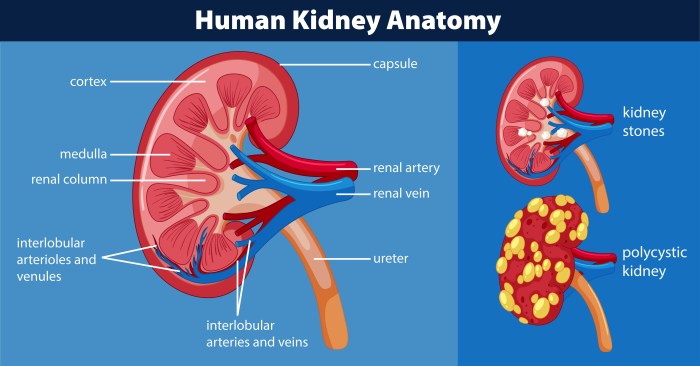
Renal disease is a major public health concern, affecting millions of people worldwide. Fortunately, there are several modifiable risk factors that can be addressed to prevent or delay the onset of renal disease. Early detection and screening are also crucial for timely intervention and management.
Modifiable Risk Factors
*
-*Hypertension
High blood pressure is a leading cause of renal disease. Controlling blood pressure through medication, lifestyle changes, and weight management is essential.
-
-*Diabetes
Diabetes is another major risk factor for renal disease. Managing blood sugar levels through medication, diet, and exercise is crucial for protecting kidney function.
-*Smoking
Smoking damages the blood vessels in the kidneys, leading to reduced blood flow and impaired function. Quitting smoking is highly recommended.
-*Obesity
Obesity increases the risk of developing diabetes, hypertension, and other conditions that can damage the kidneys. Maintaining a healthy weight through diet and exercise is important.
-*Excessive Alcohol Consumption
Heavy alcohol use can lead to dehydration, electrolyte imbalances, and direct kidney damage. Moderating alcohol intake is crucial.
-*Certain Medications
Some medications, such as nonsteroidal anti-inflammatory drugs (NSAIDs) and antibiotics, can be harmful to the kidneys if used excessively. Consult with a healthcare professional before taking any medications, especially if you have underlying kidney issues.
Early Detection and Screening
*
-*Regular Check-ups
Regular medical check-ups, including blood pressure and urine tests, can help detect early signs of kidney disease.
-
-*Family History
If you have a family history of renal disease, regular screening is recommended to monitor kidney function and identify potential problems early on.
-*High-Risk Individuals
Individuals with diabetes, hypertension, obesity, or other risk factors should undergo regular kidney function tests.
Recommendations for Promoting Renal Health
*
-*Healthy Diet
Consuming a balanced diet rich in fruits, vegetables, and whole grains is beneficial for kidney health. Limiting sodium intake, saturated fats, and processed foods is also recommended.
-
-*Adequate Hydration
Drinking plenty of water helps flush out toxins and maintain proper kidney function. Aim for eight glasses of water per day.
-*Regular Exercise
Level up your renal system knowledge! If you’re wondering “how many radians is 342”, you can find the answer here . Back to the renal system, remember to stay hydrated and take care of your kidneys!
Regular physical activity improves blood flow to the kidneys and promotes overall health. Aim for at least 30 minutes of moderate-intensity exercise most days of the week.
-*Quitting Smoking
As mentioned earlier, quitting smoking is crucial for protecting kidney health. Seek support from healthcare professionals or support groups if needed.
-*Managing Underlying Conditions
If you have diabetes or hypertension, managing these conditions effectively through medication and lifestyle changes is essential for preventing renal disease.
Case Studies
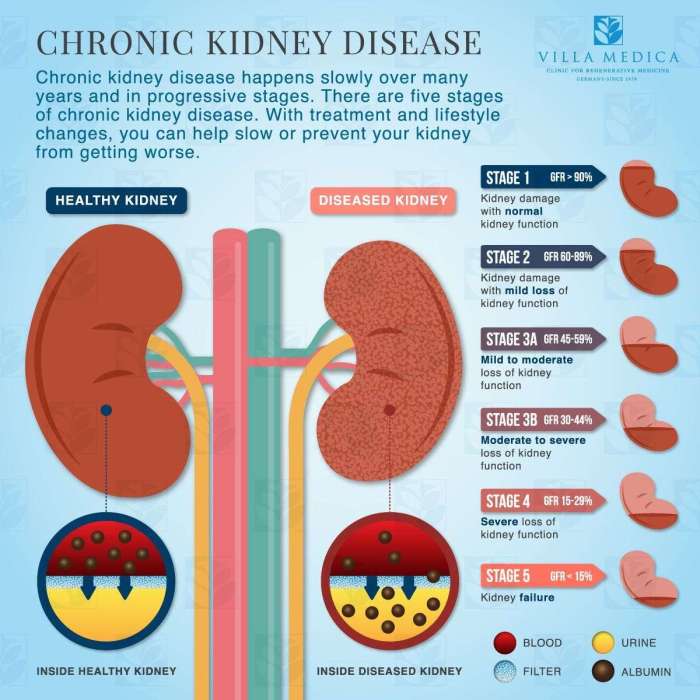
Case studies provide valuable insights into the presentation, diagnosis, and management of renal diseases. They allow healthcare professionals to examine real-life scenarios and learn from the experiences of others.
Case Study of a Patient with AKI
A 65-year-old male with a history of hypertension and diabetes presents to the emergency department with oliguria and anuria. Physical examination reveals pitting edema in the lower extremities. Laboratory tests show elevated serum creatinine and blood urea nitrogen levels. Urine analysis reveals proteinuria and hematuria.
Diagnostic Workup:The patient’s symptoms and laboratory findings suggest AKI. A renal ultrasound is performed to rule out obstructive uropathy. A kidney biopsy is not performed due to the patient’s unstable condition.
Management:The patient is admitted to the hospital and treated with intravenous fluids and diuretics to improve urine output. Antihypertensive and antidiabetic medications are adjusted to manage blood pressure and blood glucose levels.
Outcomes:The patient’s urine output gradually improves, and his serum creatinine and blood urea nitrogen levels decrease. He is discharged from the hospital with a plan for close follow-up and monitoring of his renal function.
Case Study of a Patient with CKD, Level up rn renal system
A 45-year-old female with a history of long-standing hypertension presents to the clinic with fatigue and nocturia. Physical examination reveals pallor and dry skin. Laboratory tests show elevated serum creatinine and blood urea nitrogen levels. Urine analysis reveals proteinuria and casts.
Staging:Based on the patient’s serum creatinine level, she is classified as having CKD stage 3.
Complications:The patient is at risk for developing complications of CKD, including anemia, bone disease, and cardiovascular disease.
Treatment Options:The patient is advised to make lifestyle changes, including reducing salt intake, controlling blood pressure, and managing blood glucose levels. Medications such as ACE inhibitors or ARBs are prescribed to slow the progression of CKD. Erythropoietin injections may be given to treat anemia.
Answers to Common Questions
What are the early signs of kidney disease?
Swelling in the hands, feet, and face, frequent urination, fatigue, and high blood pressure can be early indicators of kidney problems.
How can I prevent kidney disease?
Maintaining a healthy weight, managing blood pressure and blood sugar levels, staying hydrated, and avoiding excessive alcohol and drug use can help reduce your risk of kidney disease.
